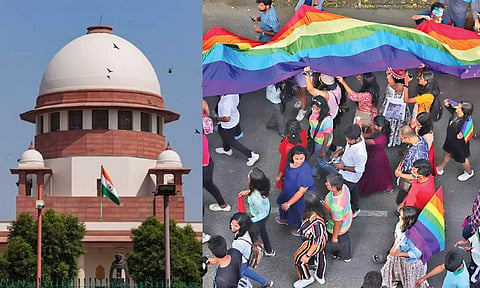

NEW DELHI: Delivering the verdict on pleas seeking legal sanction for same-sex marriage, Chief Justice of India (CJI) D.Y. Chandrachud on Tuesday said that queerness is not an urban or elite concept and the right to choose a life partner lies at the root of Article 21 of the Constitution.
He said that Article 15 of the Constitution prohibiting discrimination on the basis of ‘sex’ must be read to prohibit all forms of discrimination based on ‘sexual orientation'.
CJI Chandrachud said that the doctrine of separation of power does not take away power of judicial review and any directions or orders issued for enforcement of fundamental rights cannot be termed as violation of doctrine of separation of power.
He directed that the committee set up by the Union government will take steps to decide the rights and social entitlements of same-sex couples.
During the hearing, the top court had asked the Centre to find a way to give same-sex couples basic social benefits, like joint bank accounts or nominating a partner in insurance policies, even without legal recognition of their marital status.
In May, the Constitution Bench, also comprising Justices S.K. Kaul, S.R. Bhat, Hima Kohli, and P.S. Narasimha, reserved its judgment on the issue as to whether same-sex marriage be given legal recognition.
The batch of petitions challenged certain provisions of the Hindu Marriage Act, Foreign Marriage Act, Special Marriage Act and other marriage laws as unconstitutional on the ground that they deny same-sex couples the right to marry, or alternatively, to read these provisions broadly so as to include same-sex marriage.
The Centre, in its written submissions, had told the Supreme Court that demand for same-sex marriage is a "mere urban elitist views for the purpose of social acceptance", and recognising the right of same sex marriage would mean a virtual judicial rewriting of an entire branch of law.
The central government had stressed that petitions which "merely reflect urban elitist views" cannot be compared with the appropriate legislature which reflects the views and voices of a far wider spectrum and expands across the country.
It contended that legal validation of same-sex marriage will cause "complete havoc" with the delicate balance of personal laws in the country and in accepted societal values.